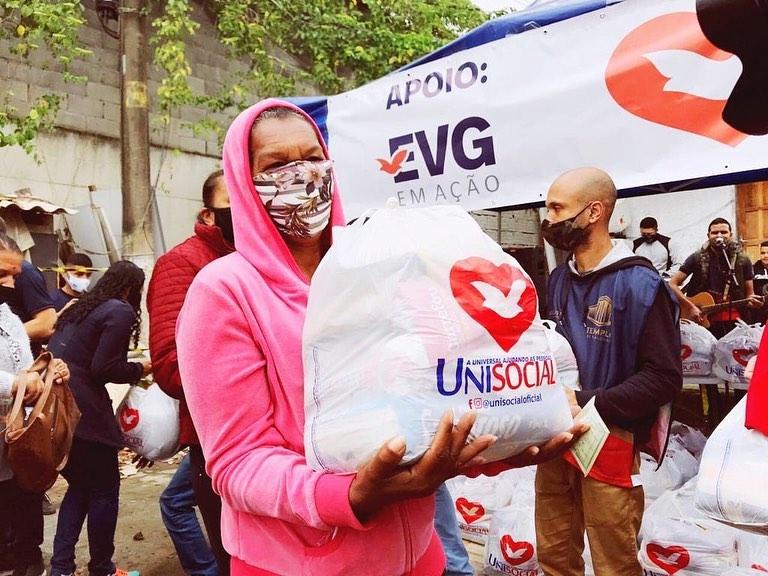RIO DE JANEIRO, BRAZIL – The evangelical world should be at the heart of the public debate on the coronavirus epidemic in Brazil. Evangelicals discount more strongly the gravity of Covid-19, and agree more with the Bolsonaro government, than does the average population, according to a recent survey by Datafolha.

This religious grouping is likely to exceed the number of Catholics in Brazil in future years, according to an estimate by the Brazilian Institute of Geography and Statistics (IBGE).
Perhaps the greatest challenge of the debate on religion and politics is to point out the perverse effects caused by the greed of some pastors, without this becoming part of the generalizing and prejudiced narrative that demonizes an entire evangelical universe, which is plural and has its own internal political disputes.
In recent days, pastors such as Edir Macedo and Silas Malafaia have done a great disservice to the fight against the epidemic, opposing social isolation and fearing the emptying of churches, which is a source of tithing and also of social cohesion. Moreover, memes and videos are multiplying in WhatsApp of charlatan pastors, claiming that those who have faith are immune, that the epidemic is a thing of Satan, a divine retribution. There are also those who offer healing recipes.
In addition to his base, Malafaia and his evangelical congressinal backbench bloc have been lobbying with Bolsonaro, who increasingly nods to this sector, constantly violating the constitutional provisions of the secular state. The President has even decreed that churches should not be closed, classifying them as an essential service.
Bolsonaro connected with believers in a very powerful way when he said, on the Ratinho TV Show, that the church is often the only thing people have. He also called for a national fast to fight the virus through faith. In more fanatical WhatsApp Bolsonarist groups, the President is featured in memes as a savior – not only of Brazil but of humanity. All this while denying, challenging, and misrepresenting science in one of the most critical moments in the country’s history.
Alternatives in the Church Spectrum?
The connection with the believer is crucial for Bolsonaro to remain in power. As long as he achieves this, his base will be strengthened and likely to grow. The evangelical churches, in this time of crisis, place themselves as an alternative for the most vulnerable populations, offering both emotional comfort and material assistance.
In recent days, groups and NGOs have been distributing food baskets in peripheral neighborhoods throughout Brazil. But they hardly come close to a warlike operation, entirely spectacularized through pictures of humanitarian aid, put together by the Universal Church. They are present and sell themselves as those who would, in fact, be acting in the social base. The greater the crisis, the more people need the Church, and the more they align with Bolsonaro.
On the other hand, as the researcher Ana Carolina Evangelista from the Institute for the Study of Religion (ISER) and Pastor Fábio Bezerril have pointed out, one must break with the notion that the great mercenary churches and pastors like Silas Malafaia and Edir Macedo represent the evangelical world. Fábio himself, like many others, is a left-wing religious leader who has said to believers – in cell phone services and Whatsapp messages – that science is a gift from God and should thus be followed.
With this, attention should be drawn to the fact that there is a much more organized rationality in the world of the evangelical churches, than what the prejudiced man in the street wants to believe: there is a world beyond the charlatan pastors and the fanatics that praises Bolsonaro.
As Ana Carolina Evangelista pointed out, the Datafolha poll figures show that, when it comes to fighting the coronavirus, the difference between evangelicals and the general population is not significant in several criteria. On the other hand, the researcher stresses that the most striking difference between the two groups is the support for Bolsonaro. According to her, this is in line with a recent pro-Bolsonaro trend of the popular base during the coronavirus crisis.

Bolsonaro’s approval grows
Evangelista’s analysis finds resonance in the preliminary ethnographic data that Lucia Scalco and another researcher are collecting in a suburb of Porto Alegre. We find more endorsement of Bolsonaro than disappointment.
Concerned with the repercussion of the coronavirus among key figures that we have been monitoring for over a decade, we decided to resume some investigation points within our networks. Our discussions are only just beginning and, consequently, nothing is conclusive here. Nor is it possible to generalize quantitatively. But we have begun to investigate certain potential trends and raise assumptions in the public debate, particularly those that may produce unsavory data. There is something that struck us: an ambivalence between understanding the significance of social isolation and, simultaneously, recognizing the impossibility of not working. That is where Bolsonaro is approved.
This fact, to a great extent, may be related to the mediation of the evangelical churches, which have had greater penetration in many communities and have been a key player during the coronavirus crisis.
The old polarization between the “worker and/or entrepreneur” and the “lowlife” figures has resurfaced. We have noticed, even if incipiently, a dispute among those who earn the ‘Bolsa Família’ (family grant) and see the hope for a change of life with up to R$1,200.00 of the basic emergency income. This segment is dreaming, making plans, and even dropping their sadness with the prospect of payment.
But there are many who do not know if they are entitled to the benefit, such as small traders, and think that the financial aid will compound an “injustice” among those who want to work. Many in this group feel that to stop working is unfair and unfeasible, but they are not denialists of the pandemic. And it is the churches – some of them neo-pentecostal fostering entrepreneurship – that will welcome this subject, raising awareness (or not) of the distancing and stressing the need to work.
It is in this sense that Bolsonaro emerges, even among some of those who did not vote for him, as someone who is succeeding in steering the crisis and connecting with popular demands. It is clear that this reality can change entirely when the deaths begin to penetrate the homes of these workers who do not even have clean water.
It seems that the current scenario may favor Bolsonaro and his penetration into popular groups. This occurs through a stance that speaks to “the Brazilian worker” in national statements. We know this is false because, in practice, his government is anti-people. But if we are to oppose this, it is no use closing our eyes and believing that Bolsonaro will destroy himself through his own stupidity, particularly amid the pandemic.
People resort to various sources of information and browse through them. Television and newspapers alert to the severity of the coronavirus. The meme says the virus is “Chinese” and has come to rule the world. On TV, Bolsonaro’s speech downgrades the need for social isolation that many people consider to be an extremism that is unfeasible for their survival needs. Churches, in turn, act on the borderline between the promise of salvation from the Satanic virus and the provision of food and medicine.
Today, any measure to fight the coronavirus will have to connect with faith and popular demands. It is unreasonable to dismiss the evangelicals of this group as ignorant and to despise the fastest growing sector in Brazil. It is a reality that is increasingly imposing itself in the country and to which one cannot close one’s eyes.
If science is the weapon we use to fight the coronavirus, it is not enough – or even effective – to impose it from top to bottom upon a segment that cannot fully adhere to this discourse right away. That is why it has never been as important to dispute, socially and politically, the evangelical world. It has never been as important for scientists to promote debates and actions with the faithful.

